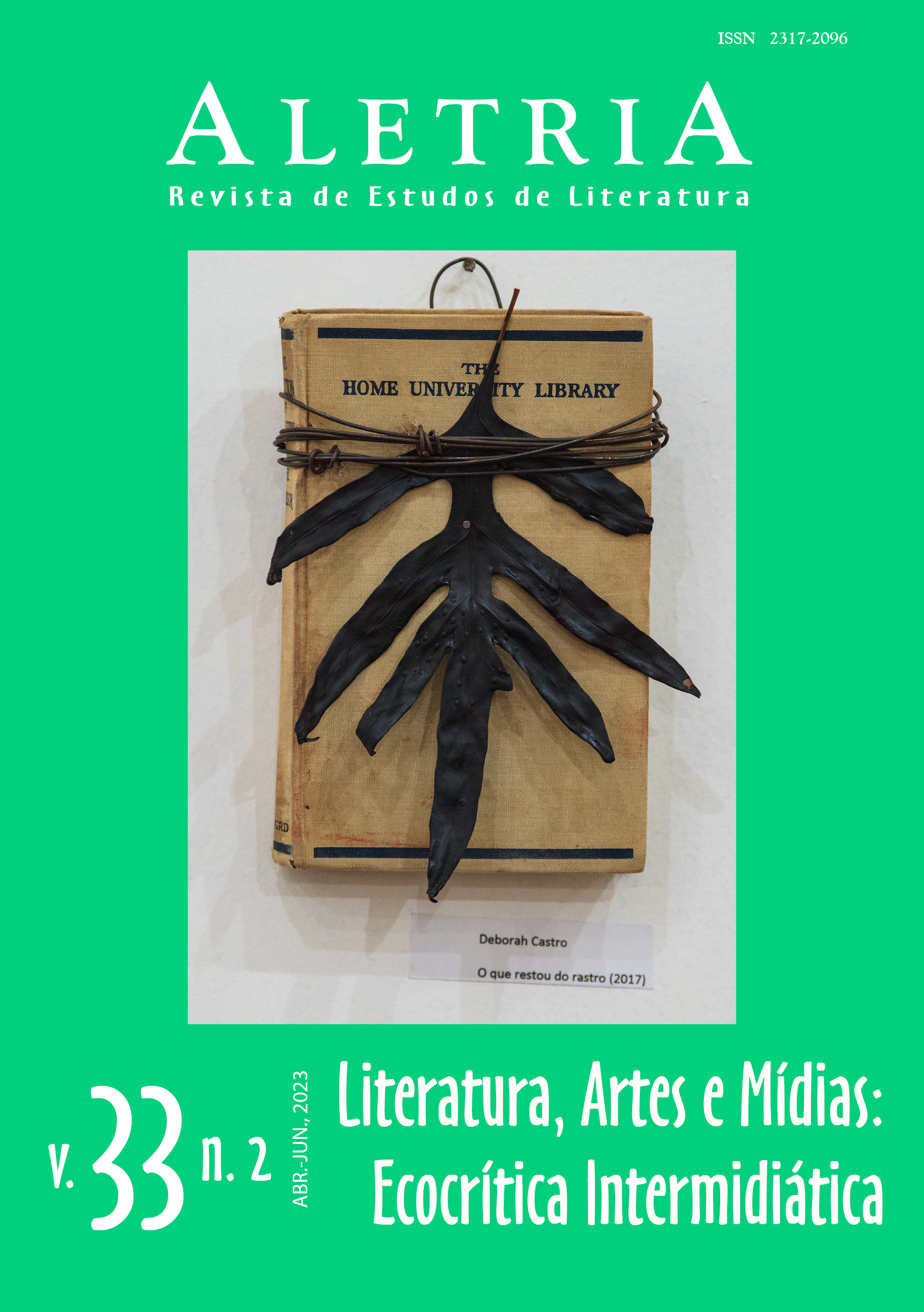Questões de leitura e de tradução em Double Oubli de l’Orang-Outang, de Hélène Cixous
Palabras clave:
Hélène Cixous, Double Oubli de l’Orang-Outang, intraduzibilidade, leitor-tradutor, citação, neutro, translator-reader, quotation, untranslatability, neutralResumen
Resumo: A partir da leitura da narrativa Double Oubli de l’Orang-Outang, de Hélène Cixous, este artigo reflete sobre três das principais características constitutivas de sua arquitetura ficcional, que, por sua vez, se configuram como a base estruturante de grande parte da obra da escritora. As três características a serem analisadas neste artigo são: a primeira, uma certa exigência da escrita cixousiana por um leitor-tradutor que seja a chave de sua transformação de livro em obra literária; a segunda, o fantasma de uma possível intraduzibilidade interpretativa que deriva tanto da particularidade do idioma ficcional cixousiano quanto de seu fluxo constante de citações diretas e indiretas de outros escritores; e a terceira, o rompimento das fronteiras entre o real e o ficcional que se direciona para o campo do neutro, tanto em termos de autoria quanto em termos do fazer literário.
Palavras-chave: Hélène Cixous; Double Oubli de l’Orang-Outang; leitor-tradutor; citação; intraduzibilidade; neutro.
Abstract: From the reading of the narrative Double Oubli de l’Orang-Outang, by Hélène Cixous, this article reflects upon three of the main constitutive characteristics of its fictional architecture, that, in its turn, constitutes the structural basis of a great part of the writer’s works. The three characteristics analyzed in this study are: the first one, a certain demand of Cixous’s writing for a translator-reader that is the key of the transformation of a book into a literary work; the second, the phantom of a possible interpretative untranslatability that arises both from the particularity of the fictional Cixous’s language and of its constant flow of direct and indirect quotations of other authors; and, the third, the rupture of limits between what is real and what is fictional that is directed to the neutral ground, both in terms of authorship and literary doing.
Keywords: Hélène Cixous; Double Oubli de l’Orang-Outang; translator-reader; quotation; untranslatability; neutral.
Descargas
Citas
BARTHES, Roland. O rumor da língua. Tradução de Mario Laranjeira. São Paulo: Martins Fontes, 2004.
BLANCHOT, Maurice. O espaço literário. Tradução de Álvaro Cabral. Rio de Janeiro: Rocco, 1987.
BLANCHOT, Maurice. L’entretien infini. Paris: Gallimard, 1969.
BRONTË, Emily. O morro dos ventos uivantes. Tradução de Stephanie Fernandes. Rio de Janeiro: Antofágica, 2021.
CIXOUS, Hélène. O riso da medusa. Tradução de Natália Guerellus e Raísa França Bastos. Rio de Janeiro: Bazar do Tempo, [1975] 2022.
CIXOUS, Hélène. Le Prénom de Dieu. Saint-Denis: Presses Universitaires de Vincennes, [1967] 2019.
CIXOUS, Hélène. Ayaï! – Le cri de la littérature. Paris: Galilée, 2013.
CIXOUS, Hélène. Double Oubli de l’Orang-Outang. Paris: Galilée, 2010.
CIXOUS, Hélène. Ève s’évade – la Ruine et la Vie. Paris: Galilée, 2009.
CIXOUS, Hélène. Hyperrêve. Paris: Galilée, 2006.
CIXOUS, Hélène. Les commencements. Paris: Grasset, 1970.
CIXOUS, Hélène; DERRIDA, Jacques. Du mot à la vie: un dialogue entre Jacques Derrida et Hélène Cixous. Magazine Littéraire – Dossier Jacques Derrida, Paris, n. 430, p. 22-29, 2004.
DELEUZE, Gilles; GUATTARI, Félix. Mil platôs: capitalismo e esquizofrenia 2. Tradução de Ana Lúcia de Oliveira, Aurélio Guerra Neto e Célia Pinto Costa. São Paulo: Editora 34, 2011. v. 1.
DERRIDA, Jaques. H. C. pour la vie, c’est à dire... Paris: Galilée, 2002.
MICHAUD, Ginette. Soi disant sujet, ou “La fiction suit son cours”: autour de Double Oubli de l’Orang-Outang d’Hélène Cixous. Études françaises, Paris, n. 48, v. 2, p. 147-163, 2012. DOI: https://doi.org/10.7202/1013339ar.
POE, Edgar Allan. O escaravelho de ouro. In: POE, Edgar Allan. Histórias extraordinárias. Tradução de José Paulo Paes. São Paulo: Companhia das Letras, 2008. p. 208-233.
SEGARRA, Marta. Morceaux d’un cri: préface. In: CIXOUS, Hélène. Le Prénom de Dieu. Saint-Denis: Presses Universitaires de Vincennes, 2019. p. 3-6.
STEINER, George. Depois de Babel: questões de linguagem e tradução. Tradução de Carlos Alberto Faraco. Curitiba: Editora da UFPR, 2005.
TROCOLI, Flavia. Insistir no Eu, destronar o Eu, passar à literatura: movimentos da obra de Hélène Cixous. Alea: Estudos Neolatinos, Rio de Janeiro, v. 22, n. 3, p. 181-195, 2020. DOI: https://doi.org/10.1590/1517-106X/2020223181195.
TROCOLI, Flavia; SOUZA, Francisco Renato de. Sob as flores – Hélène Cixous reescreve inscrições apagadas de Proust, de Freud. Alea: Estudos Neolatinos, Rio de Janeiro, v. 24, n. 3, p. 167-183, 2022. DOI: https://doi.org/10.1590/1517-106X/202224310.
Descargas
Publicado
Cómo citar
Número
Sección
Licencia
Derechos de autor 2022 Davi Andrade Pimentel (Autor)

Esta obra está bajo una licencia internacional Creative Commons Atribución 4.0.
Authors who publish with this journal agree to the following terms:Authors retain copyright and grant the journal right of first publication with the work simultaneously licensed under a Creative Commons Attribution Non-Commercial No Derivatives License that allows others to share the work with an acknowledgement of the work's authorship and initial publication in this journal.Authors are able to enter into separate, additional contractual arrangements for the non-exclusive distribution of the journal's published version of the work (e.g., post it to an institutional repository or publish it in a book), with an acknowledgement of its initial publication in this journal.Authors are permitted and encouraged to post their work online (e.g., in institutional repositories or on their website) prior to and during the submission process, as it can lead to productive exchanges, as well as earlier and greater citation of published work (See The Effect of Open Access).





